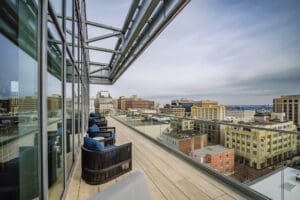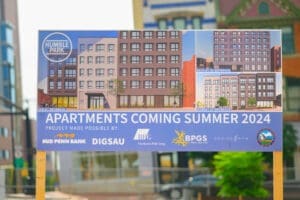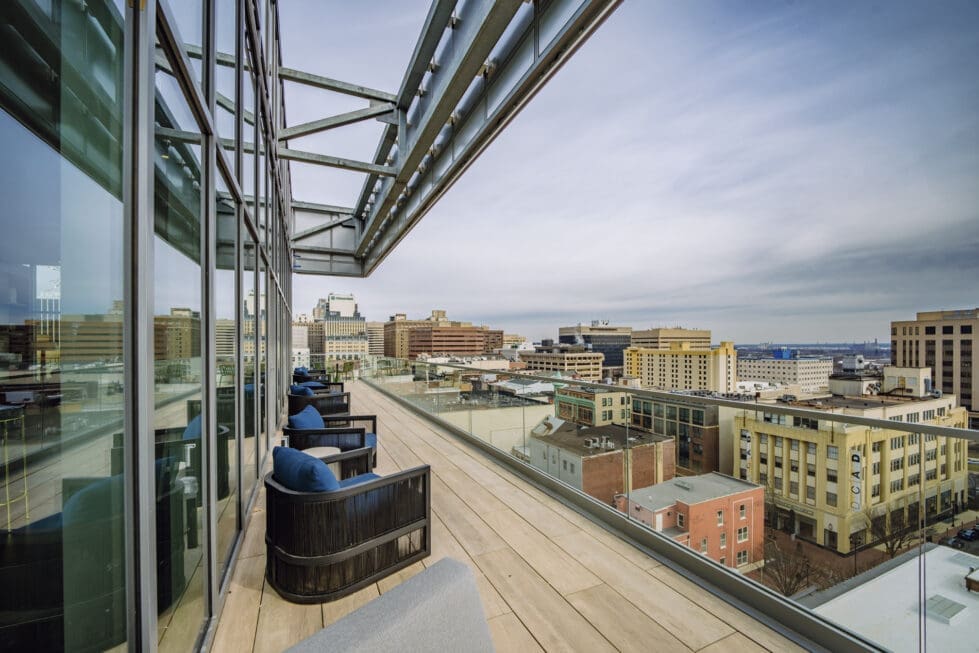
Converting office space into downtown Wilmington housing has a lot of advantages for the city, Photo by Moonloop Photography
Chris Buccini bristles when he hears people talk about sky-high vacancy rates and slow demand in downtown Wilmington.
“When I look at the Northern Delaware market, we have probably had our best year ever,” says one of the three founders of Buccini/Pollin Group (BPG).
“We’ve always been a big corporate town with companies like DuPont and MBNA, so we have some big blocks of corporate space that have been vacant in the past few years but are either being repurposed, or [buyers/big tenants] are taking a second look.”
Some of that repurposing includes converting the space from office to residential, and those changes are helping turn the city into more of the liveable, walkable space that proponents have long advocated and sought.
“Creating a density of residents downtown helps increase the foot traffic to support local businesses and we find that as more people are on the streets, the more comfortable people feel,” says Sean Park, director of the Mayor’s Office of Economic Development.
The influx of new residents adds to city wage tax revenue and encourages additional development, he said.
“Downtown Wilmington is a 25-year-old overnight success,” Chris Buccini says he tells people. “I think it’s healthier today than it’s been in half a century. It’s a disconnect to say otherwise.”
Bold guess about downtown housing
Adding more apartments in downtown Wilmington has been underway for two decades.
Between 1999 and 2017, BPG purchased DuPont’s five-property headquarters buildings, including the Nemours, DuPont, and Brandywine buildings, and two parking garages.
It has rebranded the complex as Market West and added the I.M. Pei building at 1105 North Market to the mix.
Heading into 2000, Chris and his brother Rob predicted demand for 5,000 apartments in downtown Wilmington based on an unscientific assumption that 10 percent of 50,000 downtown workers would be interested in living in a vibrant, affordable downtown.
Rob Buccini said Tuesday that BPG-owned residential units will be at the 5,000 number within the next 18 months and then at 6,000 units shortly thereafter.
“The first apartments we ever did in Delaware were at the Nemours Building,” Chris Buccini says.
There, BPG repurposed 85 furnished corporate apartments into smaller unfurnished apartments.
“We just delivered the first 92, and we’ll be at a total of 250 units by next September and 350 in 2025,” he says.
As a result, the Nemours conversion to a mixed-use complex reduced the available office space from the original 800,000 square feet first to 450,000 square feet of office space and now to just 150,000 square feet earmarked for coworking and flexible space.

While Buccini/Pollin Group has converted space in places like the Nemours Building into apartments, it’s also built several new places like Humble Park
Upside to losing DuPont, MBNA
Buccini concedes the loss of DuPont and MBNA has been a negative in many ways for downtown.
“But for the long-term sustainability of the city of Wilmington, it’s the greatest thing that could have happened” because MBNA and DuPont were islands within the city, he says.
Former employees at places like DuPont, MBNA, and Hercules have started dozens of companies, many of which are seeing explosive growth.
Many of their employees are interested in the new energy of Wilmington, a sentiment shared by Philadelphia workers willing to jump on a train to get cheaper housing rents.
It helps, Buccini says, that the City of Wilmington has put such a big emphasis on safety and cleanliness.
In total, BPG has spent nearly $350 million on 3,500 units in 16 Wilmington residential developments, according to information it provided in October to the Philadelphia Business Journal.
Since August 2020 alone, the company has opened nearly 900 downtown apartments with a total investment north of $200 million:
- 198 units at 101 DuPont Place (101 West 10th St.)
- 92 units at The Cooper (210 North Market St.)
- 41 units at Lincoln Square (308 North Market St.)
- 203 units at Crosby Hill (517 North Shipley St.)
- 355 units at The Standard (1001 North Orange St.)
BPG also broke ground in July on a 61-unit apartment building called Humble Park at 317 North Market St., and in October on a 223-unit building at 801 North Orange St. called The Press since it is the former site of the News Journal.
Humble Park will open next July, while The Press will open in July 2025.
In addition, other residential developers have followed BPG’s lead, including:
- Maryland-based Washington Place Equities (a 150-unit building at 401 A St.).
- Fort Washington-based Westrum Development (193 units at 340 South Market St.).
- YBTZ LLC (54 apartment units and some ground-floor retail at 913 Market St.).
- New Jersey-based Yada Properties, which bought the Delaware College of Art and Design Saville dormitory at the corner of Market and King streets and converted it into 42 apartment units.
King of Prussia-based Westover Cos. completed a $30 million housing redevelopment of a 14-story office building next to the DuPont Building at 901 Market St., turning it into 82 apartments. It also created 7,500 square feet of ground-floor commercial space that it leased to Regus, a shared office space company.
Separately, the city has seen the office tower at 1220 North Market St. converted to a Staybridge Suites and the conversion four years ago of the nearby Beneficial Building to a Residence Inn.
In addition, BPG invested $17 million into opening The Quoin, a 24-room boutique hotel at 519 North Market with a 155-seat restaurant, Wilmington’s first rooftop bar, and a lower-level speakeasy.

Downtown Wilmington restaurants like Bardea Food + Drink benefit from more people living downtown.
Change happens at the street level
“No one ever really knows what’s going on above the ground floor” with office space, Buccini says. “How many floors are occupied? What’s the density of the occupancy? People who were afraid to come downtown for decades are coming downtown because there’s a great restaurant or a great bar or The Queen and The Grand have great music.”
Restaurants such as Bardea Food & Drink, Bardea Steak, the DE.CO and Chancery Market food halls, Le Cavalier at The Green Room, and Wilma’s Duckpin Bowling and Restaurant drive foot traffic.
Chris Buccini also says 1.8 million people have come to the Chase Fieldhouse in 2023.
“They’re coming from all over America for kids’ lacrosse, soccer, basketball, volleyball, baseball,” he says. “They’re coming on the weekends and filling up the food halls, the restaurants and the hotels.”
He’s seeing the same thing at the expanding Kirkwood Sports facility that BPG manages, and at the DE Turf Sports Complex in Frederica.
More housing = foot traffic, wage-tax revenue
Wills Elliman, the Newmark senior managing director whose 3Q 2023 Office Market Overview set some people off, says BPG has “driven the renaissance of the city. Twenty years ago, when no one else had the vision, they saw that downtown could be a highly amenitized walkable Live-Work-Play city.”
Elliman says the efforts of developers like BPG are addressing the glut of office space, “making the downtown a whole lot more attractive, removing excess office space from the market, and helping the fundamentals greatly by lowering the vacancy rate and firming up pricing.”
Buccini says the energy extends beyond Wilmington to Concord Pike, to Delaware 141 with Wegman’s and the Amazon warehouse; to Newark’s STAR Campus; and to Middletown and the Beaches.
In fact, he says, many BPG properties have seen occupancy increase substantially since the start of the pandemic.
“We got a bit of a triple whammy of COVID, working from home, and then higher interest rates,” he says. “We thought companies would start pushing people back to work after Labor Day and they are. Is it ever going back to Monday through Friday, nine to five? Absolutely not, but the new hybrid work schedule is still evolving. We’re seeing more and more people in the office every month. Our parking garages are picking up and the food halls are picking up.”
Share this Post




